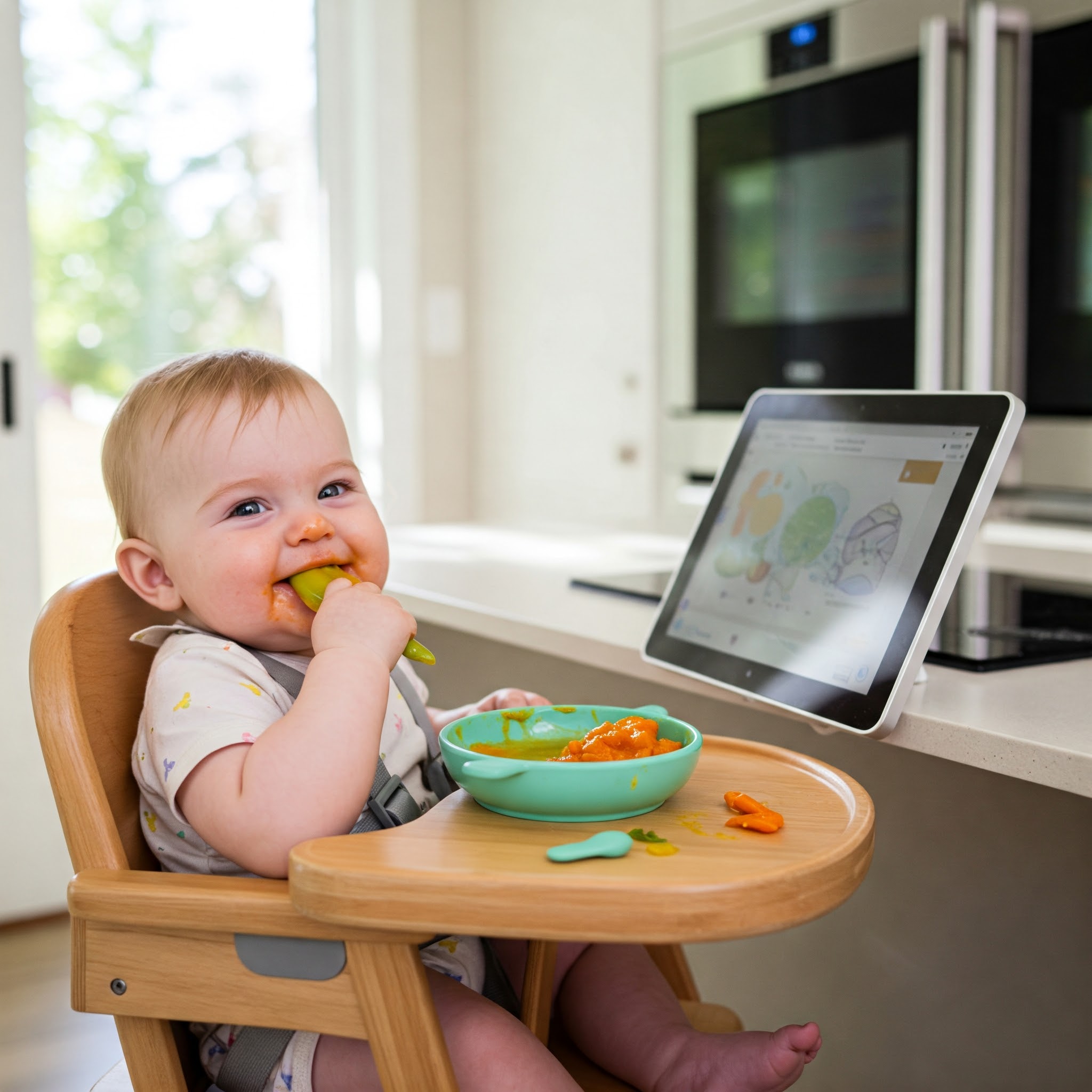
A New Era in Nurturing
The world of parenting has never stood still—but in 2025, it’s sprinting forward at an unprecedented pace. In nurseries glowing with smart monitors and kitchens stocked with organic finger foods, a quiet revolution is taking place: the transformation of baby feeding from instinctive tradition into informed science.
Say goodbye to cookie-cutter feeding guides and hello to a brave new world of personalized baby nutrition—where every spoonful, every sip, every nutrient is tuned to the unique symphony of your baby’s biology.
Why One-Size-Fits-All No Longer Fits
Each baby is born a singular masterpiece—complete with their own microbiome, metabolism, and temperament. And yet, for decades, feeding recommendations were painted with a broad brush. Generic baby food jars, mass-produced formulas, and rigid timelines ruled the pantry.
But science has pulled back the curtain. We now understand that the earliest stages of life—especially the first 1000 days from conception to toddlerhood—are not just critical. They’re foundational. During this pivotal time, nutrition is more than sustenance; it’s cellular programming. This is the promise and power of first 1000 days nutrition.
Feeding your baby is no longer just about “what” or “when.” It’s about “who.” Who is this child? What do they need? And how do we meet those needs with purpose?
The Rise of Bio-Individuality in Babyhood
The term “bio-individuality” may sound like something out of a biotech textbook, but its meaning is refreshingly simple: what works for one baby might not work for another. One infant may flourish on avocado and quinoa; another may need a slower introduction to complex plant proteins.
Custom infant meal plans are emerging as the answer to this nutritional riddle. Created using insights from genetics, gut health, and developmental milestones, these plans give parents a roadmap that reflects their child’s unique blueprint.
Imagine being able to adjust iron intake based on your baby’s absorption rate, or choosing probiotics that complement their gut flora. With digital tools and pediatric dietitians working in tandem, this level of precision is not futuristic—it’s already here.
Technology in the High Chair: Feeding Gets a Digital Upgrade
Modern parents are data-driven. They track sleep, monitor milestones, and now, they can map meals. AI-powered apps analyze food logs, behavioral feedback, and even stool patterns to recommend adjustments in real time. It’s the era of responsive nutrition.
Wearable tech has also joined the high chair. Tiny sensors in pacifiers can now monitor hydration and electrolyte balance. Smart spoons measure intake. Biometric bracelets track temperature and stress levels. All these inputs contribute to crafting tailored baby diets that flex and flow with your child’s changing needs.
Of course, technology doesn’t replace intuition—it enhances it. These tools empower parents to make informed decisions with confidence, backed by evidence, not guesswork.
Cultural Shifts: From Feeding to Nourishing
Across cultures, feeding has always been an act of love. But nourishing—deeply, intentionally, and personally—has taken center stage. Today’s parents don’t just want their children to grow; they want them to thrive. They’re blending tradition with innovation, choosing ingredients not just for flavor, but for function.
Instead of defaulting to rice cereal, parents now opt for omega-rich flaxseed porridge or antioxidant-packed beet purée. Culinary diversity is encouraged early, expanding palates and strengthening immunity. It’s no longer just about avoiding allergens; it’s about enhancing resilience.
This is early childhood nutrition with a passport—global, informed, and deeply attuned to developmental needs.
The Micronutrient Mission
Within each cell of your baby’s growing body, a microscopic symphony unfolds. Zinc triggers DNA synthesis. DHA builds brain tissue. Choline supports memory. These micronutrients—often overlooked in conventional advice—are the quiet architects of baby growth and development.
With personalized baby nutrition, parents can target specific developmental windows with the right nutrients at the right time. For example, a surge in iron is vital around 6 months when maternal stores deplete. If a baby has a genetic predisposition to low iron absorption, that need becomes even more urgent.
It’s not about stuffing babies with supplements—it’s about nourishing them with intentionality.
Gut Instincts: The Microbiome Connection
Nestled in your baby’s belly is a universe teeming with bacteria—most of it beneficial. This microbiome is instrumental in immune function, digestion, and even mood regulation. The foods introduced during infancy shape this internal ecosystem for life.
That’s why infant health and wellness starts with the gut. Probiotic-rich foods like kefir, miso broth, and fermented veggies (in baby-safe forms) are becoming go-tos in custom infant meal plans. For babies born via C-section or formula-fed, special prebiotic combinations can help compensate and support gut diversity.
The new rule? Feed the baby—and their microbiome.
Personalized Nutrition for Special Cases
Every baby is different—but some arrive with unique challenges. Premature birth, food sensitivities, metabolic conditions, or slow growth require extra precision. Here, tailored baby diets aren’t a luxury; they’re a necessity.
Pediatric nutritionists can work with geneticists and allergists to design nutrition protocols that adapt in real time. Whether it’s adjusting texture for oral-motor delays or selecting hypoallergenic proteins for eczema-prone skin, personalized plans can turn feeding from a stressor into a solution.
Parents are no longer left to navigate food fears alone. Expertise is accessible, and the path forward is clear.
The Role of Parents: Nourish the Nourisher
Amid all this innovation, one truth remains: no app, no formula, no tech can replace the heart of parenting. And for caregivers to give their best, they must be well too.
Personalized nutrition extends to parents, especially breastfeeding mothers. Their diets affect milk composition, energy levels, and mental clarity. A parent depleted cannot pour from an empty cup.
Work-life integration is also changing the feeding landscape. With more flexible hours and remote work, many parents are reclaiming mealtimes. Homemade purees, baby-led weaning, and garden-to-table snacks are not out of reach—they’re becoming lifestyle cornerstones for families seeking deeper connection.
A Look Ahead: The Next Generation of Feeding
The trajectory is clear: feeding is becoming a science, an art, and a personalized ritual all at once. Startups are developing at-home testing kits for nutrient gaps. Subscription services deliver meal kits aligned with a baby’s current phase of development. Pediatric AI is learning to detect feeding issues before symptoms surface.
And as research continues to uncover the connections between early nutrition and long-term health—lower rates of obesity, diabetes, ADHD, and even depression—the importance of intentional feeding only grows.
The future of baby growth and development begins at the high chair.
Conclusion: Crafting the Nourished Child
This isn’t about perfection. It’s about personalization. About seeing your child not just as a mouth to feed, but a life to nurture, neuron by neuron, bite by bite.
In this reimagined era of personalized baby nutrition, food is no longer a checklist—it’s a conversation. Between science and soul. Between body and future. Between parent and child.
Because when you feed your baby based on who they are—not who a chart says they should be—you’re not just fueling growth. You’re honoring individuality. You’re building resilience. And most importantly, you’re setting the table for a lifetime of well-being.




